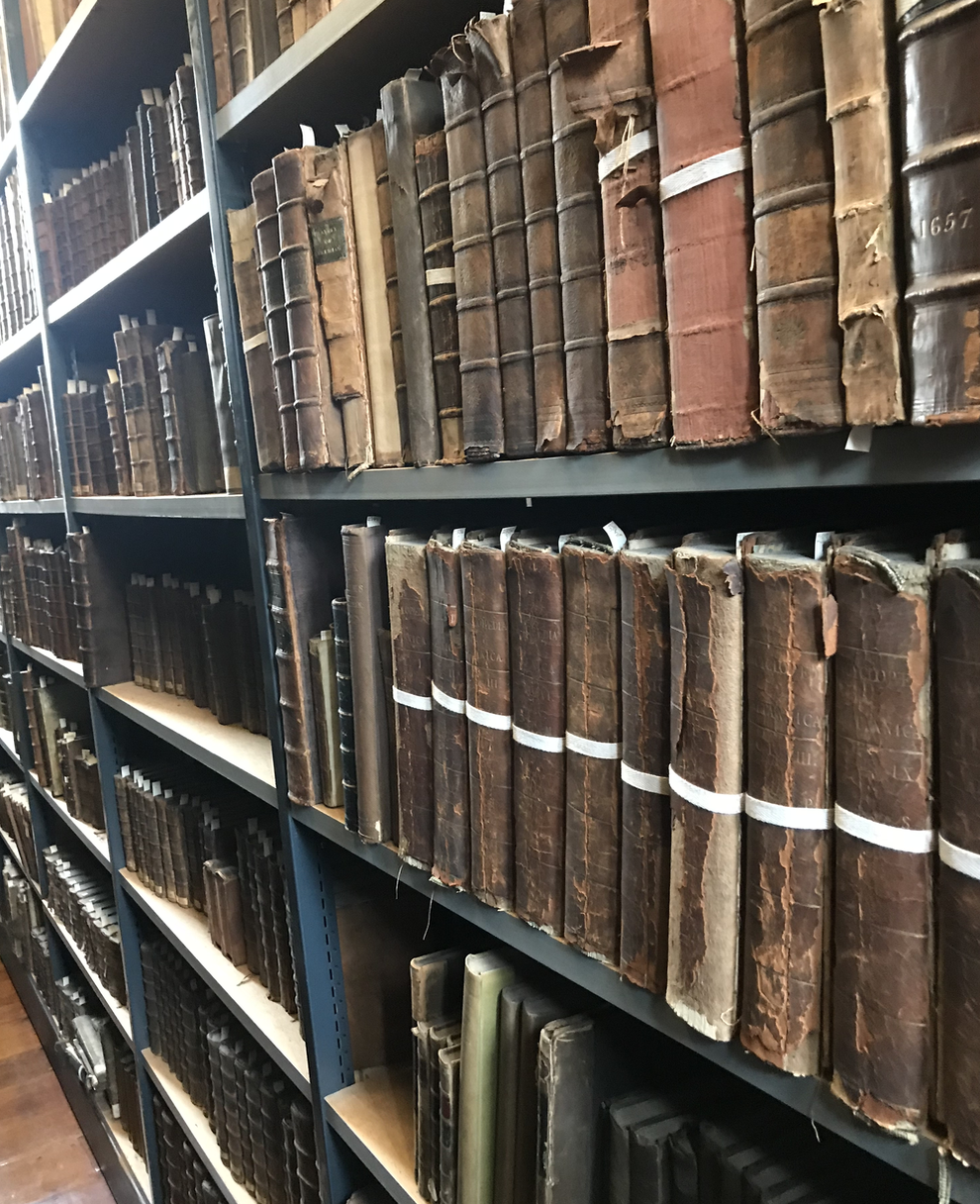by Amanda C. R. Clark
Evidently Amazon can now deliver products directly into my home or car; the AARP periodical (for persons over fifty) says we can swallow a pill that will give the weak of heart their injections internally; and my new computer unlocks via the proximity of my watch, while a tiny button registers my fingerprint and authorizes my Apple Pay to buy and mail a new wok to an engaged couple for their wedding. My husband tells me it’s all moving too fast and then asks if I think young people can still read printed handwriting. I think so, but then again, maybe not.
The following is an autumnal revelry on the old and slow technologies. I work in a library full of books that I will defend keeping until the end of my days. One summer a few years back I collected dozens of fun-looking tomes—books about books—onto a squeaky book cart and wheeled them down to my lamp-lit office. Two students, Sarah Sprouse (now a teacher in Shanghai) and Sophia Du Val (now a grad student at the Pratt Institute in New York), poured over these books, intent and whispering in hushed tones, with frequent giggles as they extracted their favorite quotes. My instruction to them was simply to create a little bibliography of intriguing quotes from these printed treasures. The following is a selection of those sometimes wise, sometimes wry quotes.
“Books have been published that have radically changed the world. Indeed, books have been written about those books.”[1]
“He has never been known to use a word that might send a reader to the dictionary” (William Faulkner regarding Ernest Hemingway).
“Poor Faulkner. Does he really think big emotions come from big words?” (Ernest Hemingway regarding William Faulkner).[2]
“Neither all men nor all books are equally sociable.”[3]
“Books give a deeper meaning and interest to living. There is nothing in daily work, in the most humdrum occupation, that cannot be made more interesting or more useful through books.”[4]
“A library is true fairyland, a very palace of delight, a haven of repose from the storms and troubles of the world.”[5]
“Reading begins with wonder at the world about us. It starts with the recognition of repeated events like thunder, lightning, and rain…. Reading is the practical management of the world about us.”[6]
“First, there has to be quiet about us, peace within us; then we are ready for them. Of an evening, on returning home from tiresome errands; some day at noon when one is weary of his fellow men; in the morning when one is cloudily half-awake after dream-laden sleep—only then is one ready for books.”[7]
 Oxford: “With the essays the only formal requirement, one might do as he pleased: read novels, write poetry, walk along the river, sleep till noon, go to London, bicycle through the Cotswolds, or spend sixteen hours a day reading for the next tutorial.”[8]
Oxford: “With the essays the only formal requirement, one might do as he pleased: read novels, write poetry, walk along the river, sleep till noon, go to London, bicycle through the Cotswolds, or spend sixteen hours a day reading for the next tutorial.”[8]
“If the trend toward bureaucratization and mechanization continues, I predict a revolution, not by librarians, but by readers—townspeople, students, and teachers—those who use the library in their need for knowledge and delight, who think of the library as a kind of temple, and who sicken of social scientists and personal psychologists of documentalists and gadgeteers, in places of power. These good people, who expect libraries to be manned by librarians will invade the libraries one fine day and drive the pretenders into the streets, saying, ‘If you choose to worship false gods, do it elsewhere, not in the libraries’.”[9]
“There is something about the proximity of all that knowledge, the nearness of all that great writing, the smell of all those books, that is intoxicating to the extreme…. Is there not a more wholesome, more educational, more cathartic and enjoyable activity in all of life’s experience than the reading and loving of books? Do not books represent learning and intellect and everything good and proper about society and life?”[10]
“Books are everyday fixtures of our lives, guides and measures of civilization. To try and extract the book from our lives would be fatal.”[11]
[1] Leona Rostenberg and Madeleine B. Stern. Between Boards: New Thoughts on Old Books (Montclair: Allanheld and Schram, 1978), 93.
[2] James Charlton, ed. Fighting Words: Writers Lambast Other Writers – From Aristotle to Anne Rice (Chapel Hill: Algonquin, 1994), 100.
[3] William E. Gladstone, On Books and the Housing of Them (Lake Oswego: Blackwell, 1998), 26.
[4] Helen E. Haines, Living with Books: The Art of Book Selection (New York: Columbia University Press, 1968), 5.
[5] John Lubbock. The Choice of Books (Lake Oswego: Blackwell, 1999), 33.
[6] Frank Jennings, This Is Reading (New York: Columbia University, 1965), 3.
[7] John David Marshall, Of, By, and For Librarians: Further Contributions to Literary Literature (Hamden: Shoe String Press, 1960), 3.
[8] Willie Morris, My Two Oxfords (Lake Oswego: Blackwell, 1993), 7.
[9] Lawrence Clark Powell, A Passion for Books (Cleveland: World Publishing, 1958), 212.
[10] Tom Raabe, Biblioholism: The Literary Addiction (Golden: Fulcrum, 1991), 2 and 13 respectively.
[11] Daniel J. Boorstin and the Library of Congress. Books In our Future: A Report from the Librarian of Congress to the Congress (Washington: Library of Congress,1984), 4.
Amanda C. R. Clark is Library Director at Whitworth University. She has published in areas of architecture, biography, book arts, and the significance of books. Clark holds a PhD in library and information sciences from the University of Alabama.
